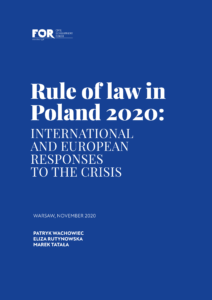Report: Rule of Law in Poland 2020: International and European responses to the crisis
In its second report, the Civil Development Forum (FOR) evaluates measures used by the European Union, Council of Europe and other international actors to deal with the rule of law breakdown in Poland
The ongoing negotiations between the EU institutions and members states about how to link funding to respect for rule of law might lead to another tool ensure that member state comply with the treaties. In this report, Rule of Law in Poland co-founder, Civil Development Forum (FOR), evaluates previous activities and tools employed by the European Union, other international organisations and foreign bodies regarding the rule of law crisis in Poland.
The report deals mostly with the political and judicial measures adopted by the European Union, due to the profound impact of the situation in Poland to the bloc and the broad array of tools used against it, but also refers to the Council of Europe, the United Nations and its agendas, and private or unilateral responses to the crisis. It further elaborates on the assessment of the tools deployed by the said actors and, lastly, offers recommendations on how to deal with the rule of law crisis in the most efficient way.
In the first part, FOR analysed the current state of the rule of law from domestic and comparative perspectives. It explained the reasons behind the key Law and Justice policies regarding the justice system and presented main changes in the courts and prosecution service since 2015.
Executive Summary:
- As a member of various international and European organisations, Poland is bound by the requirement to respect the rule of law so as to effectively fulfil its commitments and ensure sincere cooperation between all member states.
- The crisis of the rule of law in Poland endangers the proper functioning of the international organisations Poland belongs to. That risk depends directly on the level and scope of integration and the importance of mutual commitments.
- The European Union has not sufficiently used its tools to combat the crisis. While judicial measures employed by the Court of Justice effectively prevented the situation from getting worse, political tools, such as Article 7(1), have been watered down and require improvements.
- Despite the limited array of measures at the disposal of the Council of Europe and the United Nations, they form an important basis for judicial bodies and contribute to the prevention of a crisis. In particular, the opinions of the Venice Commission and the summary of the UN Special Rapporteur on the Independence of Judges and Lawyers provide independent and reliable assessments of the state of play in Poland in light of international standards.
- Moreover, tools employed by individual actors, in particular international organisations of judges and lawyers, allow the international community to familiarise itself with Poland’s situation, and provide reliable sources in specific areas of the crisis, e.g. the role of the National Council of the Judiciary.
- It is highly recommended that international bodies, most importantly the European Union, realise the fact that time is of the essence when it comes to deal with the rule of law crisis in Poland. Since infringement actions before the Court of Justice have been the most efficient measures so far, it is important that other tools facilitate them by providing up-to-date and reliable evidence, also covering new developments in Poland.
The publication is supported by the Friedrich Naumann Foundation for Freedom. The Friedrich Naumann Foundation for Freedom is not responsible for the content of this publication, or for any use that may be made of it. The views expressed herein are those of the author(s) alone. These views do not necessarily reflect those of the Friedrich Naumann Foundation for Freedom.
